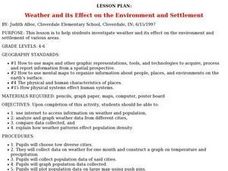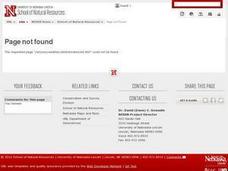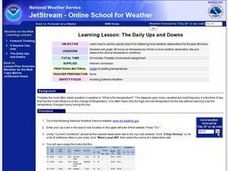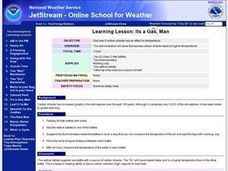Curated OER
Building a Quinzee
Students demonstrate knowledge about the basic properties of snow. They collaborate together in groups of 4-6 students to construct a Quinzee and investigate its basic structure and why it is effective. They examine the temperature...
Curated OER
What's the temperature of the snow at different levels?
First graders measure the temperature of snow at different levels by participating in an experiment. They discover that snow is an insulator and use thermometers to find out the snow temperature. They record the temperature of snow on...
Curated OER
Weather and its Effect on the Environment and Settlement
Students, after choosing two diverse cities, collect data on weather for a month and construct a graph on temperature and precipitation. After collecting population data of said cities, and graphing it, they plot population on a large...
Curated OER
Design your own Water Temperature Experiment
Learners use Robolab sensors and software to design an experiment that incorporates the use of temperature probes. They conduct the experiment, complete a lab sheet, evaluate the results and then consider if their hypothesis requires...
Curated OER
Optional Laboratory: Comparing Soil Temperatures In Sun and Shade
Students work together to test the temperatures of different soils in shade and sun. They make their own hypothesis before beginning the experiment. They record their data and discuss as a class.
Curated OER
Oceanography
Second graders identify saltwater and freshwater habitats and the resources found in them. They compare and contrast the two habitats and discuss their findings. They discover the resources bodies of water can provide.
Curated OER
Temperature Variations and Habitability
Pupils, in groups, evaluate conditions outside the building and inside the classroom using thermometers, barometers, anemometers, etc. They compare interior and exterior conditions. They consider and discuss factors that contribute to...
Curated OER
Am I Hot or Am I Cold?
Young scholars practice using a thermometer to determine how the air around the earth gets heated and cooled by the sun. Students chart the daily inside and outside temperature for two weeks.
Curated OER
Learning Lesson: That Sinking Feeling
Students discover the origin of the Great Ocean Conveyor. They participate in a demonstration showing how salinity and temperature affect water density. They also examine the new sea ice that forms every winter.
Curated OER
Learning Lesson: Ups and Downs
Students use the internet to find the air temperatures in their area. They create a graph based on the data. They analyze the data and examine tips for avoiding extreme weather.
Curated OER
Learning Lesson: Its a Gas, Man
Young scholars participate in a demonstration in which they examine the effect on temperature by carbon dioxide. They discuss the effects of carbon dioxide on the environment. They also examine summer safety rules to end the lesson.
Curated OER
Today's Weather on Mars
Students investigate the temperature and wind data locally, nationally, and internationally and compare these conditions to those on Mars. Conclusions are drawn about the differences of these conditions and the causes for the variance...
Curated OER
Weather Plots
Students investigate the relationship between temperature and humidity. The graphs of weather data gathered and plotted for for an assigned period of time are analyzed and the interpretations shared with the class.
Curated OER
Cruise Conditions Graphing & Statistics
Students monitor weather conditions for an eighteen day period at a specific location. The temperature of both air and water is taken and the mean, median, and mode calculated. Differences between the highest and lowest recordings are made.
Curated OER
Understanding the Layers of the Earth
Fourth graders explore the three layers of the Earth describing the composition, thickness, and temperature of each layer. Layers are compared and contrasted and data unearthed placed into graphic organizers.
Curated OER
Warm Me Up!
Third graders explore and identify heat sources. They conduct an experiment involving thermometers and articles of clothing, and record and discuss the results.
Curated OER
Temperature Graphing
Students analyze temperature variations throughout the world by using computer graphing of select major national and international cities. After analyzing their findings, students write a paragraph explaining their data.
Curated OER
Handboiler Lab
Students participate in a handboiler experiment, using a sealed glass vial filled with alcohol. They record the data and do averages and see if there is a difference between a boiler and a non-boiler.
Curated OER
Air-Plant Interaction
First graders observe, measure, and predict the growth of bean seedlings. They construct graphs of their findings after altering the temperature of the air for the seedlings. They deduct what would happen if the temperature was much lower.
Curated OER
Keeping Cool
Young scholars investigate the air conditioner units around the school. They chart the temperature by placing a thermometer in different situations and decide how to keep cool and save energy in the summer.
Curated OER
Living Thermometer
Students count the number of times a cricket chirps in a sixty-second span and subtract 40, divide by 4 and add 50. They compare the answer to the degrees in Fahrenheit.
Curated OER
Science: How Tall Are Plants
First graders investigate plant growth and examine what factors contribute to plant growth. They keep a class chart of plant growth and write about and illustrate their conclusions.
Curated OER
Meteorologists
Fourth graders investigate the work of a meteorologist and then take on the identity of one to make reports on clouds and temperature.
Curated OER
Plants Help Keep a House Cool!
Pupils experiment with tree shading and house colors to see how to reduce the temperature of a home.

























